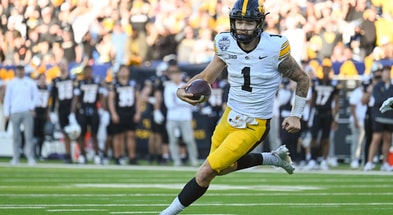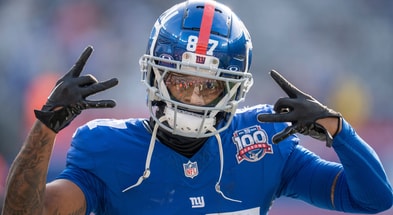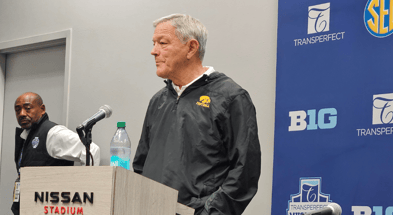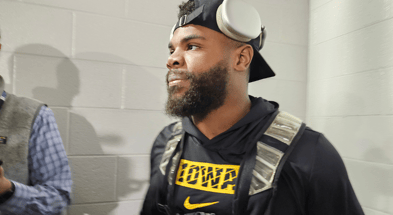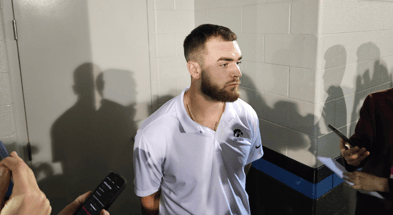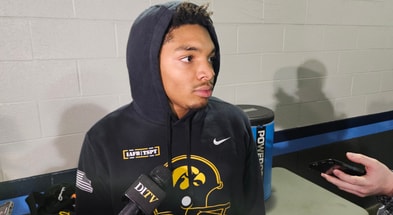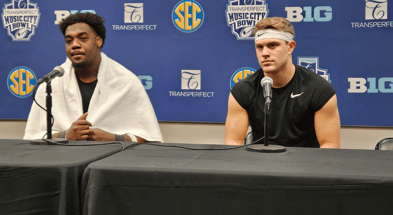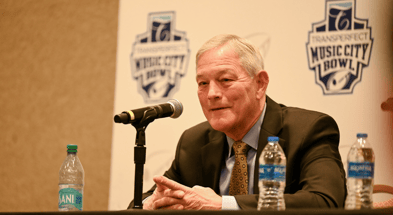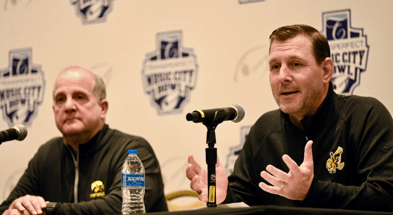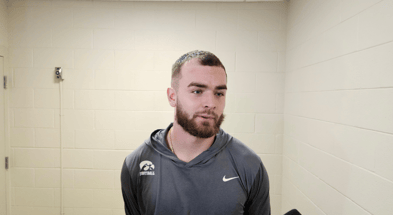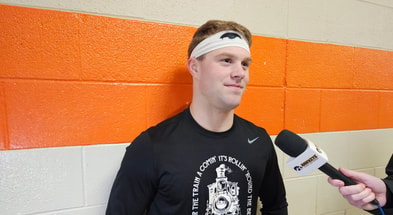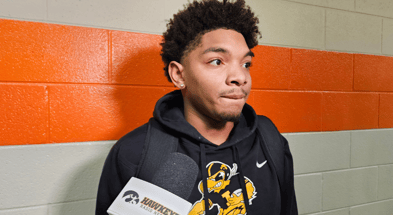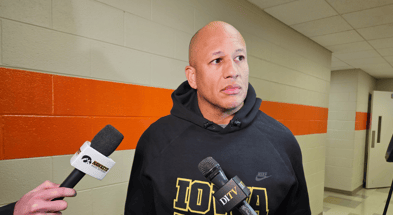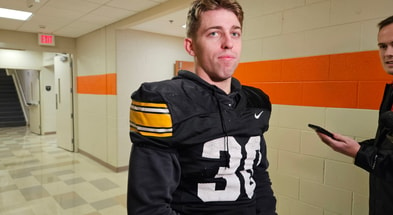Tim Lester talks the future of Iowa's offense
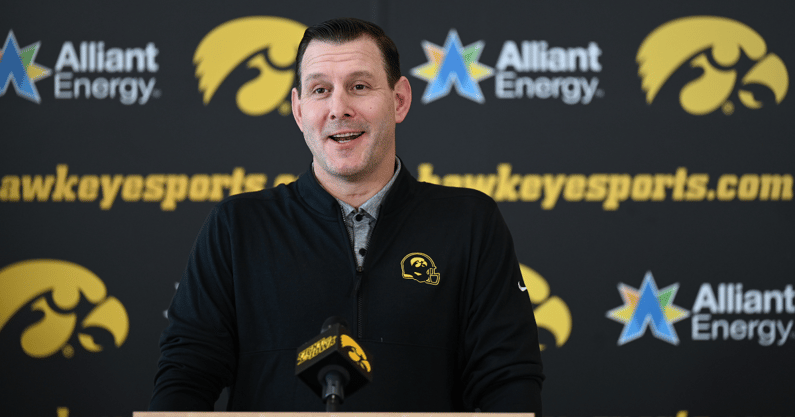
For the first time since he was announced as Iowa’s offensive coordinator, Tim Lester met with the media. The new man to guide the Iowa offense talked in some detail about his plan. He discussed his love of tight ends, shared that he will be calling plays from the press box, and how the Iowa offensive might look in terms of formations.
Q. I think there’s a lot of questions about the wide receiver usage. Iowa has only had one wide receiver with 600 or more yards since 2016. It’s a position that comes with a lot of ego and wanting touches. Coming into Iowa City, how are you going to reinvent the wide receiver positions because I think you said in your opening comments you want to put a product that people want to be a part of, so from a strictly wide receiver perspective, how are you planning to do that?
TIM LESTER: Well, obviously wide receivers are a huge part, no matter what you’re running, schematically. But putting them in position is the biggest key.
Through my time in coaching, I think we’ve been around quite a bit of pretty good ones, and we’ve been able to find ways to get the ball in their hands. There’s a lot of ways to do that, whether it’s screens, whether it’s straight drop-back, whether it’s putting them in the backfield. The flexibility of an offense is key.
I haven’t had a chance to meet all the wide receivers yet, but I want to make sure that the quarterback understands that we are going to spread the ball around and he’s going to read his keys as he’s supposed to. It’s my job to make sure that one of those first couple options is the guy that we want it to be.
Had some success with that and plan on keeping it going.
Q. Were you calling plays in 2021 at Western Michigan?
TIM LESTER: Yes, Jake Moreland and I. Jake is my best friend, and we think the exact same. We played together, we coached together 80 percent of our adult lives, and we kind of groomed and he was ready. We kind of hopped in and kind of team did it that year, but three years before that I called him.
Q. I’ve been studying the 2021 season because that was a terrific offensive year for Western Michigan. I’m curious what you remember about that season in terms of the production, how that could maybe apply to what you want to do here. I see a lot of things here like rushing attempts, time of possession. The wins were good ball security, those types of things.
TIM LESTER: Yeah, I think we were top 10 in the country in time of possession. Never huddled, which was unique.
Team, I felt like we did a good job running the ball, finding our run lanes, and the pass comes after that. We never even talk about throwing the ball until we figure out how to move the ball on the ground.
That was an explosive team. The one thing that people don’t — maybe it’s because I’m a quarterback, always have been and coaching them. We’re going to do what that person does best, and Kaleb was good at it.
Before that we had Jon Wassink was my first couple years our quarterback, and he was great at drop-back, going through a progression. That was his thing.
I just saw a trophy, the Campbell trophy in there. Jon was a finalist for that, which is an award that Jack won. Jon was a finalist when Justin Herbert won it.
It changes every year depending on who you have and what he does well. That guy behind the center matters.
Figuring out what he does well, because if you have a flexible enough offense, we can call it anyway he wants it. That year Kaleb was really good at the RPOs. We had some pretty dynamic wide receivers, D’Wayne Eskridge and Skyy Moore. We had two second-round draft picks out there running around. So that combination that year was a great mix. We had a great combination with Jake upstairs and me on the field.
Yeah, every experience can help us moving forward, but we’ve got to figure out kind of what we’ve got and what’s the best way for us to be efficient, aggressive, run the ball and help the team win, and we’ll do those things whatever they are.
Q. How do you blend or what’s the process of blending stylistically what you’ve done before with the RPO with other things with what Iowa has done historically and has found success doing historically?
TIM LESTER: It’s a process that started a couple days ago. But it’s an exciting process. To get everyone’s opinion in and I have all kinds of playbooks, what’s going to jibe with what they know and where we think we can improve.
I’ve coached long enough now that I’ve run a lot of systems. In 2008 when I was a Division III coach, Seth was talking about that, we ran the Shanahan system. He was the quarterback coach at the Houston Texans. Matt, who I played college ball with, got him coffee. I think that was his official role. So I got the playbook then and we ran that at Elmhurst. At Syracuse when I took over we took over a spread offense that didn’t even have a tight end and we tried our best to blend them together.
Then we went to Purdue and got to run the Saints’ offense, which was cool. Learned a ton. Then on to Western where I had an offensive coordinator my first year and then when I took over, tried to put a little bit of that in it.
Then to go back and work with Matt this year was full fledged, that system. Everyone runs that system a little bit differently but it’s fun to get back after 10 years of being versions of it, it was fun to just be in it and watch all the teams in the league run a version of it, not all of it but a good portion of it.
There’s a lot to choose from, and I hate to keep going back to this, but I can’t wait to see what we have.
But I definitely know how to tie them together, and a lot of the formationally and how we’re going to build it, what gets called will be dependent on kind of what we see in the spring and what we see as the guys move around here in the next couple months.
Q. Iowa’s offensive struggled are well-documented from last year. In taking a look at the roster and the personnel, what gives you confidence that you can come in here and help move this program in the right direction?
TIM LESTER: Well, I love tight ends. I’m a huge fan. Everywhere I’ve been, our tight end has been all-conference normally. I guess as a quarterback, that’s the guy you start with. Some people use them, some people don’t. I love the fact of what they can do to a defense in the run game, in the pass game, in the play pass game, in the keeper game. It also can open up things out on the edges, too.
I know there’s an unbelievable tradition here of that, and I’ve heard we have some good ones. Everything is I’ve heard this and I’ve heard that. But I can’t wait to see with my own eyes.
But that part of this offense of running 12 personnel, which is really what we did at Elmhurst and a little bit at Syracuse, that fits what I have a lot of experience in. Let’s put it that way.
But none of those work if you can’t run the ball. So you go to a place if you want to run an offense that’s going to be physical and run the ball, you’ve got to go to a place that can run the ball. I have looked at the numbers there to make sure that that can happen, and we’ve had success, and we have to continue to have success to get the rest of it to go.
So that combination of those things make me really excited about what’s coming.
Q. Sidelines or press box for a game? And Cade McNamara is likely going to miss most of the spring. What is the challenge when your starting quarterback is not available to you on the field for spring ball in trying to implement your offense?
TIM LESTER: I would say to the first question, A. Question A, I would say up. I prefer being up. I like to see the game from up there. I think being an offensive coordinator is about making adjustments. I’ve called games for a long time. I was a head coach at I want to say 24 years old or 25 years old, so I think I’ve called a game with 70 passes, and I’ve called 70 runs in a game. You have to make adjustments as it’s happening because they have a plan, too.
When you’re having to think and make adjustments, I just think being in the environment up in the booth is a way better learning environment than sometimes on the sideline where it gets very emotional.
I know as the head coach I had to call from the sidelines, so that guy up in the booth was the most important person in the world to me, that we thought the same way.
But it became my preference. Pretty sure I’ll be up.
The second half of your question is the one thing I would tell you is we need to get the horses to the race. Whenever Cade is ready to go, I’m looking forward to working with him. But there is absolutely zero way that you can discount his experience. When you have experience in playing in games, I’m very confident that he’ll pick it up when it’s time, when he’s healthy, when he’s ready. If he didn’t have a ton of experience, I’d be more scared, more worried.
But he’s got to get healthy and be good to go when he gets his chance, and he’ll be out there every single day we’re out there whether he can throw it or not. He’ll get a lot of learning in, but he has played games, and that is invaluable when it comes to quarterback play, so I’m excited about that part of it.
Q. A question about Cade McNamara; he’s somebody who’s had experience as you mentioned. What are some ways, assuming he’ll be healthy by the start of the season, that you can accentuate and elevate him as a quarterback?
TIM LESTER: You have to make him comfortable, number one. Everybody is comfortable doing different things. I think sometimes quarterback coaches, they have things they like to do. I’m not married to anything. I’ve run a lot of things. I have a unique experience as far as levels and have been a D-coordinator.
Top 10
- 1
CFP's 'utlimate flaw'
Paul Finebaum takes aim at CFP
- 2New
Bevo will attend Cotton Bowl
Texas mascot set to return
- 3Hot
Lane Kiffin
Parting shot at CFP committee
- 4
Mocking Beamer
Juice Wells trolls Shane Beamer
- 5Trending
Kirby Smart
Calling out Sugar Bowl refs
Get the On3 Top 10 to your inbox every morning
By clicking "Subscribe to Newsletter", I agree to On3's Privacy Notice, Terms, and use of my personal information described therein.
I have to figure out what he’s good at, and I have to put him in those situations as much as possible.
I’ve watched a little bit of film on him, not enough that I can comment on any of that. But the things that I need him to get better at, we have to focus on. You get what you emphasize.
We’re going to make sure that he can do the things that I think this offense should be able to do well, and if there’s things he’s really good at, we’re going to do them. Much like we were talking about the RPOs earlier, Kaleb was great at them, so we did that a lot, and it worked. I’ve got to get to know him and make sure — every quarterback. There’s a couple — the year I was the offensive coordinator at Syracuse, we lost our starting quarterback, I want to say it was play seven. It was an achilles, like an Aaron Rodgers thing, and then the backup went down and I ended up playing walk-on, and the offense totally changed. We had to change.
I’ve got to get to know each guy and what they do well so that we can call the offense to have the most success when he’s in there. But that’s on me to make sure I can figure that out and put them in good position to have success.
Q. You’re going to be coaching quarterbacks?
TIM LESTER: Yes, sir.
Q. Route concepts, what structure do you like to run, especially because you ran so much RPO? How do you like to build your concepts beyond the line of scrimmage? You’ve run a lot of 11 personnel, probably 90 percent of it that I’ve seen —
TIM LESTER: Yeah.
Q. How do you anticipate that working within kind of the foundation of what Iowa likes to do because 12 is such a staple here?
TIM LESTER: Yeah. I look at myself as a 12 guy. The years we had 12, I can remember my first couple years at western we had 12, and those were good years, where I felt more comfortable with what we were doing.
At Elmhurst College we were 100 percent 12. That’s all we ran the entire season.
Either way, when it comes to route concepts, you’ve got to understand the timing of the quarterback’s footwork, and we can build — it’s kind of like piecemeal every week. You’re building the concepts.
There’s some full fields where we’re going to call it, he’s going to know his progression and we’re going to go to work. We’ll have four, five or six of those that he’s comfortable with. But I think the flexibility in the passing game is what makes the offense I ran in college, which is more of a Spurrier stuff compared to what Shanahan does and how they build their progressions every week. It might look like a different route combination every week, but we will change them based on coverages and what we’re seeing, but I want to get the quarterback comfortable with the same thing over and over again. The key is to have him do the same thing over and over again and have the defense think it’s a different play.
We like these two or three things against this coverage and we like this on the backside against this coverage and you can mix and match them and you get five on the front, five on the back, and the iterations of those two, and then you add shifts and motion to it, you can really put a guy in a comfortable situation where he knows what’s going on. It might not look like that to the defense. That’s the plan. But it all starts with what we’re getting and what he’s comfortable with.
So we have to get him — we’ve got to get it installed, figure out what he’s comfortable with, and then we can build it from there.
It always starts with the coverages we’re getting and what our guy is good at, and then I feel like we can always build it from there.
I’ve got 600 pages of pass plays in there, figuring out what he’s good at and getting good at something, jack-of-all-trades, master of none is not what we need to be about. We need to figure that out so we can get really good at something.
Q. What you said before, RBO, relationships before opportunity, regarding that, a lot of coaching is not just Xs and Os but a matter of trust, building relationships. A lot of guys you haven’t met, guys who were playing for a different guy under a slightly different system four months ago. What is the key in coaching you’ve been around different places and being an offensive coordinator and earning trust of those guys, especially in these first few weeks when you’re meeting them for the first time, showing them these new things?
TIM LESTER: You’re exactly right. I think the biggest thing is sitting down and learning who they are because it does matter. We have cut-ups and they get to watch some NFL cut-ups, and I think they always appreciate that, running some of the things that they’ve run at that level that we’ve had success running at that level. But it’s the most important thing is for me getting in front of them and really just asking where they’re from because I don’t know for a lot of them. Some of them are from my backyard in the suburbs of Chicago. Some are from Iowa. Some are from Australia. I met him the other day. He didn’t have to tell me where he was from. I knew. It was awesome to meet him.
That’s the key because I know once we have that relationship, then it’s time to go to work. I’ve got to show them kind of our ideas of what we want to do. I really want to see them all move around. I’m excited to start getting the playbook put together, which is going to take some time, and really watching all of last year’s film to watch the guys play.
I haven’t had a chance to do that yet over this weekend, these four days, but that’s what’s coming soon.
Q. How much do you value mobility at the quarterback position, and will that be a priority moving forward when recruiting?
TIM LESTER: I value efficiency at the quarterback position. Mobility would be a bonus. If I can get both, 100 percent I’m all for it. Who doesn’t want that, right? But there has to be efficiency first, and I think sometimes people get enamored with the mobility, and when they have to drop back on a 3rd down to get us a 1st down or a two-minute drill to go win us the game, we can’t fall short in that scenario. You have to play quarterback first. You have to be able to move the sticks with your feet, and the more you can do, the more we can do when it comes to running the ball.
It’s a great icing on the cake if you can have it, so I’m always looking for it, but I’m not going to go away from a guy that I think can really execute an offense and make throws and be efficient as a quarterback just because if he can’t do that, I’m not going to just take him because he can run a little faster.
Q. Back in 2022 at Western Michigan, how much of the play calling were you involved with, and what did you take away from that season?
TIM LESTER: Well, I hired a new offensive coordinator. He came in and put in his system. I was going to be more of a head coach. I took over the last three or four games. We were struggling. We weren’t playing complementary football. We were turning the ball over. We lost our quarterback in Skyy Moore. They had two years left before they were done with their eligibility, and they left in January to go to the NFL Draft. Obviously I was excited for them, but it threw us off guard a little bit. It’s worked pretty well for Skyy, obviously won one Super Bowl and is going to another one. Excited for him.
So we were struggling personnel-wise. So I think we won three of our last four. It wasn’t pretty. It was what we had to do. I played a true freshman quarterback and two freshman wide receivers, and we kept ourselves in games, let our defense play great. We found a way to win those games when that’s what we had. That was our best foot forward.
Yeah, I think I called the last four that year and had to call different words than I’m used to calling, so I had to read it off a sheet, which is harder for me than normally the guy that puts it in his back pocket and doesn’t take it out.

